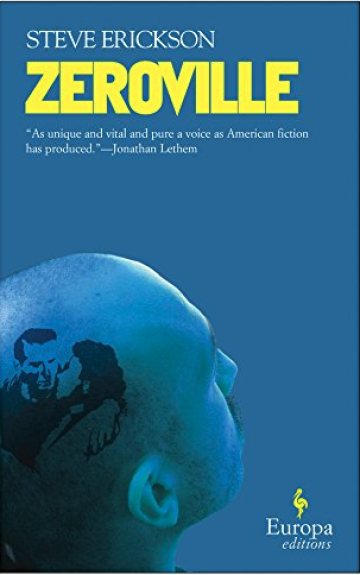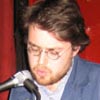Establishing Shot: An Interview with Steve Erickson
Steve Erickson's many novels (Days Between Stations, Rubicon Beach, Tours of the Black Clock, Arc d'X, Amnesiascope, The Sea Came in at Midnight, Our Ecstatic Days) read as if written for the readership of other worlds- worlds not different from ours so much as parallel, the real turned upside-down, inside-out, and yet centered, inevitably, around Los Angeles; an alternate cityscape, purged of cloying commerciality, populated by dreamers, and informed not by mundane and compromised reality, but by a rarefied innocence that, transposed through metaphor to describe our own condition, offers our reading and dreaming lives, here and now, a modicum of hope, and even-redemption. The perceptual skew of his new book, Zeroville, turns Hollywood into Babylon, or an Eden redux. Here, Erickson gives us his tightest establishing shot yet: an image of film as the Scripture of a secular age. Its hero, Vikar Jerome, is a film editor who, in the rise and fall of his career, uncovers the secret history of our time-call it a celluloid Apocrypha-through a madcap, and maddening, resplicing of film frames. What results-what is framed-is nothing less than a new Creation Myth. What is created is nothing less than us.
Erickson, movie critic for Los Angeles Magazine, and editor of Black Clock, published by CalArts, where he teaches, responded to questions about his Zeroville via email.
KGB: First off, is this book any sort of roman a clef? Factual characters are fictionalized everywhere: Charles Manson, Martin Scorsese, Robert De Niro; Vikar, your film editor hero, has Montgomery Clift and Elizabeth Taylor tattooed on his skull. Your character Viking Man is, fairly obviously, John Milius, most famous for having written the script for Apocalypse Now, and, also, as being lampooned by John Goodman for his character in the Coen Brothers' Big Lebowski. With all this background, is Vikar himself based on anyone real?
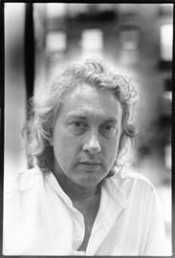 Erickson: No roman a clef, other than that the story is set in the context of those real events, as you indicated, with references to those real people. When a novelist creates a character there may be a model, but if the book comes to life at all, the character becomes his or her own person. You're right that Viking Man clearly is inspired by Milius, but I don't know Milius and have never met him-so it's more precise to say that Viking Man is my version of a Milius, trying to stay clear of the Lebowski portrait, at least in my own head, while acknowledging at the same time that I drew on select facts of Milius' life that are identifiable to anyone who knows anything about movies. Vikar is more a full creation, with a little bit from this source and a little bit from that. It was when he came together for me as a character that the book came together too.
Erickson: No roman a clef, other than that the story is set in the context of those real events, as you indicated, with references to those real people. When a novelist creates a character there may be a model, but if the book comes to life at all, the character becomes his or her own person. You're right that Viking Man clearly is inspired by Milius, but I don't know Milius and have never met him-so it's more precise to say that Viking Man is my version of a Milius, trying to stay clear of the Lebowski portrait, at least in my own head, while acknowledging at the same time that I drew on select facts of Milius' life that are identifiable to anyone who knows anything about movies. Vikar is more a full creation, with a little bit from this source and a little bit from that. It was when he came together for me as a character that the book came together too.
KGB: A follow up. Vikar is Vikar Jerome-does his name have anything to do with St. Jerome, himself a Vicar of sorts, the 5th-century translator of the Bible to Greek? Are you trying to say that film editing, Vikar's eventual profession, is, itself, a form of translation?
Erickson: Well, my calculation wasn't that erudite or smart. But I was aware that the name "Jerome" conveyed a kind of churchly quality, if you will, and I certainly did see Vikar's natural creative role as a mediator rather than as, if you will, an originator-more the prism than the light, through whom we see fifteen years of cultural upheaval in movies and music, in the L.A. of the seventies and early eighties. We never really understand Vikar, of course, whether he's a savant or just sort of socially retarded, but Viking Man's characterization of him as not a cineaste but "cineautistic" captures him better than anything.
KGB: Vikar begins as an excommunicated theology student, and ends as a famous film editor (winning the only editing prize ever given at Cannes) who unwittingly uncovers a secret history of the world, dispersed in the frames of various films. Is film, to you, a holy medium-"holy" as in the archaic sense of "magical"? Do you think art is a replacement, or usurpation of sorts, of scripture, or of the authority of religion?
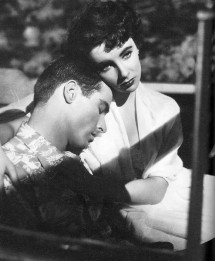 Erickson: I think of art and scripture as coming from the same place, which is an effort to interpret what is beyond interpretation. For true film obsessives-which is to say more obsessive than I-there almost is no higher truth than film. When Godard concluded one of his films with the words, "End of cinema," by which he meant not just the end of his particular movie or his particular work but the end of an art form, it was intended to have the same impact as those who declare the "end of history" or that God is dead. I love movies and always have, but I'm not someone who's truly consumed the way that Vikar is or some of the filmmakers who came out of the seventies-Scorsese, Schrader, Spielberg, De Palma, Bogdanovich. There are too many other things I care about. There have been large periods of my life when I was just as consumed by music or fiction or politics. But all of those things aspire to the transcendent.
Erickson: I think of art and scripture as coming from the same place, which is an effort to interpret what is beyond interpretation. For true film obsessives-which is to say more obsessive than I-there almost is no higher truth than film. When Godard concluded one of his films with the words, "End of cinema," by which he meant not just the end of his particular movie or his particular work but the end of an art form, it was intended to have the same impact as those who declare the "end of history" or that God is dead. I love movies and always have, but I'm not someone who's truly consumed the way that Vikar is or some of the filmmakers who came out of the seventies-Scorsese, Schrader, Spielberg, De Palma, Bogdanovich. There are too many other things I care about. There have been large periods of my life when I was just as consumed by music or fiction or politics. But all of those things aspire to the transcendent.
KGB: All of your books tend to propose stories that teeter between metaphor and realism, or, better, actuality-Vikar's discovery of this secret history is a perfect example of this technique. Do you believe in an objective reality outside of your books? Or-is "everything possible"?
Erickson: I don_t know. This is one of those questions where even our definitions of "objective" are up for grabs-which may answer your question right there. I accept "objective reality" but I leave open the possibility that there's something bigger.
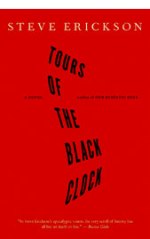 KGB: "Zeroville"-read: Hollywood-is shown here in its dissolution. The studio system is bankrupt. Angry young filmmakers appear, and begin doing things their own way. Charles Manson & family kill people. Drugs are everywhere. The music changes, cranks louder. How did you yourself experience this shift in the early 1970s? And does the counterculture of those years and the years just prior have any relevance to today's mass culture?
KGB: "Zeroville"-read: Hollywood-is shown here in its dissolution. The studio system is bankrupt. Angry young filmmakers appear, and begin doing things their own way. Charles Manson & family kill people. Drugs are everywhere. The music changes, cranks louder. How did you yourself experience this shift in the early 1970s? And does the counterculture of those years and the years just prior have any relevance to today's mass culture?
Erickson: I was a teenager in the sixties and in my twenties in the seventies, so I came of age during that time and it had enormous impact on me. Even then the moment was special, crystalline-there was a sense of possibility, and I keep feeling the current era trying to find its way back to that same sense, though that might be noxious boomerism talking. At the same time there also was a way in which, living in L.A., I was at odds with the more immediate culture, and while generally Vikar isn't very autobiographical, some of his experiences brush up against mine. Living in Echo Park in the early seventies, I was the only person I knew in L.A. who owned a Roxy Music record. I was the only person I knew who owned a Stooges record or a New York Dolls record or a Mott the Hoople record or an Eno record. I didn't listen much to the Eagles or Carole King or James Taylor. So I felt at one with the culture and at odds with it.
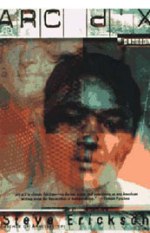 KGB: Film editing is the subject of remarkable little essays scattered throughout the book. Have you picked up anything from film editing applicable to your own work? The form of Zeroville-small chapters, arranged symmetrically, climaxing at middle only to rewind numerically back to zero-seems as if influenced by the form, or only the appearance of the form, of a screenplay. How influential have cinematic techniques been on your writing?
KGB: Film editing is the subject of remarkable little essays scattered throughout the book. Have you picked up anything from film editing applicable to your own work? The form of Zeroville-small chapters, arranged symmetrically, climaxing at middle only to rewind numerically back to zero-seems as if influenced by the form, or only the appearance of the form, of a screenplay. How influential have cinematic techniques been on your writing?
Erickson: Well, I was a film student at UCLA before resigning myself to the fact that whatever talent I had -and certainly my temperament-was better suited to writing novels. That said, the movies had an enormous impact on me and on my fiction. There was a conscious decision to tell Zeroville's story according to the narrative laws of a movie, in action and dialogue and movie references, in a linear structure that didn't feel compelled to motivate everything, short scenes cutting to other scenes, and the Godardian numbers. I read a book called The Conversations, a series of interviews between Michael Ondaatje and film editor Walter Murch, which was a revelation-after the third reading I had to make myself stop, because I worried it would influence me too much. Murch is an amazingly smart guy, something verging on a renaissance man-I thought I knew something about movies and editing, and reading the book, I was daunted by how much I didn't know, and still don't. But the striking thing was how often the editing decisions Murch makes resemble some of the decisions a novelist makes. Minute decisions that come down to a few frames or a few words, that no viewer or reader can possibly register except subliminally-but all those subliminal decisions have a cumulative impact.
KGB: Montgomery Clift, besides being the subject of Vikar's tattoo, makes a cameo appearance. You seem to have chosen him due to his outsider status (homosexuality, drug abuse), his brooding aspect, and his survival of that terrible auto accident. Who is the literary equivalent of Montgomery Clift?
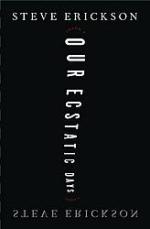 Erickson: Wow, great question. You've got me. I have no idea. Somehow I don't think it's Philip Roth. I chose Clift for all the reasons you mention, and also because I really did begin with that image tattooed on Vikar's head-the close-up of Clift and Elizabeth Taylor on the terrace in A Place in the Sun-because it's such an emblematic image of the movies in all their dreaminess, and it's hard to think of two better looking people so perfectly matched in their beauty, two people who had more cinematic chemistry, a chemistry that clearly was bigger than sex. After that moment, I'm not sure the movies were ever again as persuasively romantic.
Erickson: Wow, great question. You've got me. I have no idea. Somehow I don't think it's Philip Roth. I chose Clift for all the reasons you mention, and also because I really did begin with that image tattooed on Vikar's head-the close-up of Clift and Elizabeth Taylor on the terrace in A Place in the Sun-because it's such an emblematic image of the movies in all their dreaminess, and it's hard to think of two better looking people so perfectly matched in their beauty, two people who had more cinematic chemistry, a chemistry that clearly was bigger than sex. After that moment, I'm not sure the movies were ever again as persuasively romantic.
KGB: Hoping not to give too much away for free-but Vikar's discovery of the scattered film frames is wonderfully frightening. His discovery seems to flirt with the idea that we haven't created film, film's created us. Is film the ultimate medium? Or is it, itself, replaceable with future technologies? How do you deal with film-as-ultimate-medium, or with a technological replacement to film (the Internet, the interactive), as a novelist, as a writer-as someone working in one of the oldest mediums, in the medium least conducive to such change in format or technology?
Erickson: I was seventeen or something when I saw a Claude Lelouch movie called Live for Life and had an epiphany exactly along the lines you've mentioned: "Movies are the Ultimate Art Form!" It shows how you can be influenced by something as bad or cheesy as a Claude Lelouch movie, something that, even as you're seeing it, you know isn't very good, and paradoxically the very thing about it that is cheesy or not very good is the thing that's revelatory-in this case, the overwrought use of cinematography, music,editing. This is why I don't get too hung up on "good taste"-you learn a lot from the things that constitute "bad taste," which of course raises the question of just how bad the bad is, or just how good the good is.
At the time, it seemed clear that art couldn't go farther than movies, probably because we had no notion of virtual art or cyberculture, at least I didn't. That was when I became a film student, watching movies all day andsupplementing it with classes in literature and political philosophy. But in the end, like most creative people I didn't choose my medium, it chose me, and I make the best of it. It doesn't matter if fiction is a dying art-and it may be-it's what I'm cut out to do, for better or worse, either well or not, which is for others to decide, obviously. Obsolescence may be my destiny. But it doesn't matter.
